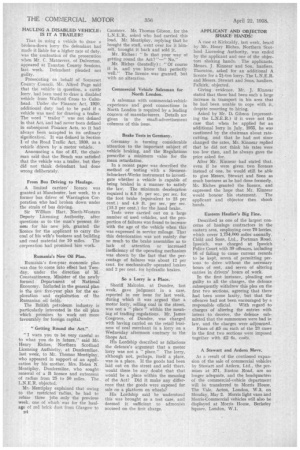HAULING A DISABLED VEHICLE: IS IT A TRAILER?
Page 38

If you've noticed an error in this article please click here to report it so we can fix it.
That in using a vehicle to draw a broken-down lorry the defendant had made it liable for a higher rate of duty, was the contention of the prosecution when Mr. C. Matravers, of Dulverton, appeared at Taunton County Sessions. last week. Defendant pleaded not Prosecuting on behalf of Somerset County Council, Mr. Alfred Page said that the vehicle in question, a cattle lorry, had been used to draw a disabled vehicle from Watford Cross to CuImhead. Under the Finance Act, 1920, additional duty had to be paid if a vehicle was used for drawing a trailer. The word " trailer " was not defined in that Act, and had never been defined in subsequent Finance Acts, so it had always been actepted in its ordinary signification'. It was defined in Section 1 of the Road Traffic Act, 1930, as a vehicle drawn by a motor vehicle.
Announcing a fine of £1, the chairman said that the Bench was satisfied that the vehicle was a trailer, but they did not think defendant had done wrong deliberately.
From Bus Driving to Haulage.
A limited carriers' licence was granted at Manchester, last week, to a former bus driver of Warrington Corporation who had broken down under the strain of bus driving.
Sir William Hart, North-Western Deputy Licensing Authority, after questions as to the man's present fitness for his new job, granted the • licence for the applicant to carry the coal of his wife's business and building and road material for 10 miles. The corporation had promised him work.
Rumania's New Oil Plan.
Rumania's five-year economic plan was due to come into effect last Tuesday, under the direction of M. Constantinescu, Minister of the newly formed Department of National Economy. Included in the general plan is the new five-year plan for the exploration and exploitation of the Rumanian oil fields.
The British petroleum industry is particularly interested in the oil plan which promises to work out more favourably for foreign capital.
"Getting Round the Act.".
"I warn you to be very careful as to what you do in future," said Mr. Henry Riches, Northern Scotland Licensing Authority, at Dunfermline, last week, to Mr. Thomas Mentiplay, who appeared in support of an application by his mother, Mrs. Helen N. Mentiplay, Dunfermline, who sought renewal of a B licence and extension of radius from 25 to 50 miles. The L.N.E.R. objected.
Mr. Mentiplay explained that owing to the restricted radius, he had to refuse three jobs only the previous week, one of which was for the haulage of red brick dust from Glasgow to B4 Canmore. Mr. Thomas Gibson, for the L.N.E.R., asked who had carried this load. Mr. Mentiplay, replying that he bought the stuff, went over for it himself, brought it back and sold it.
Mr. Riches : " Is that your way of getting round the Act? "—" No."
Mr. Riches (heatedly) : "Of course it is, and you know that perfectly well." The licence was granted, but with no alteration.
Commercial Vehicle Salesman for North London.
A salesman with commercial-vehicle experience and good connections in North London is required by a leading concern of manufacturers. Details are given in the small-advertisement columns of this issue.
Brake Tests In Germany.
Germany is turning considerable attention to the important subject of vehicle braking, and the Regulations prescribe a minimum value for the mean retardation.
In a recent paper was described the method of testing with a SiemensSchuckert-Werke instrument to investigate whether a vehicle is capable of being braked in a manner to satisfy the law. The minimum deceleration required is 8.2 ft. per sec. per sec. for the foot brake (equivalent to 25 per cent.) and 4.9 ft. per sec. per sec. (15.2 per cent.) for the hand brake.
Tests were carried out on a large number of used vehicles, and the proportion of failures was found to increase with the age of the vehicle when this was expressed in service mileage. That this deterioration was not mainly due so much to the brake assemblies as to lack of attention or increased inefficiency of the operating mechanism was shown by the fact that the percentage of failures was about 12 per cent, for mechanically operated brakes and 2 per cent. for hydraulic brakes.
So a Lorry is a Place.
Sheriff Malcolm. at Dundee, last week, gave judgment in a case, reported in our issue for last week, during which it was argued that a motor lorry, selling coal in the street, was not a " place" within the meaning of trading regulations. Mr. James Cosgrove, of Dundee, was charged with having carried on the retail business of coal merchant in a lorry on a Wednesday afternoon contrary to the Shops Act.
His Lordship described as fallacious the defence's argument that a motor lorry was not a "place." The lorry, although not, perhaps, itself a place. was in a place. If the goods had been laid out on the street and sold there, would there be any doubt that that would be a place within the meaning of the Act? Did it make any difference that the goods were exposed for sale on a platform on wheels?
His Lordship said he understood this was brought as a test case, and deemed it sufficient to admonish accused on the first charge.


































































































